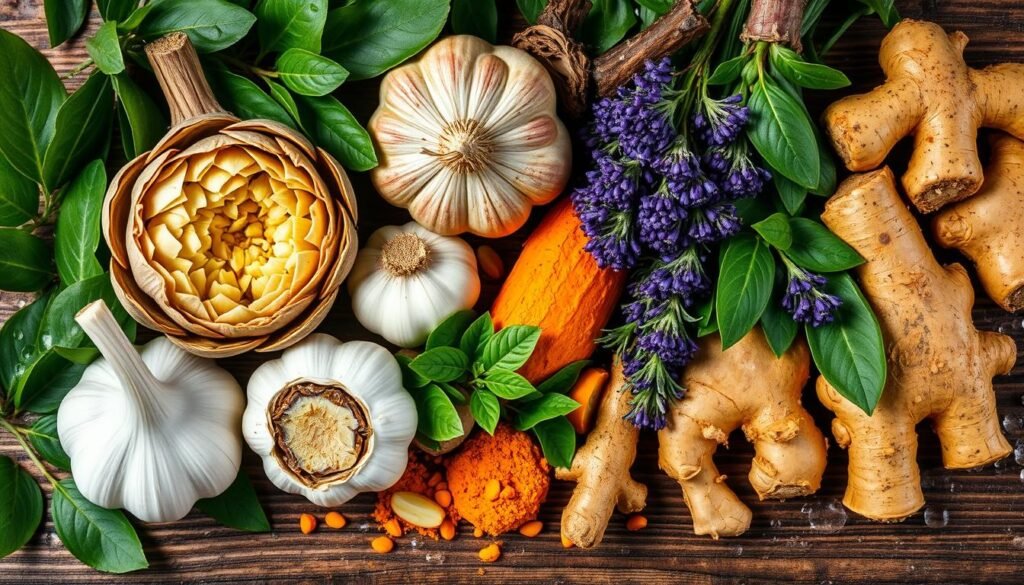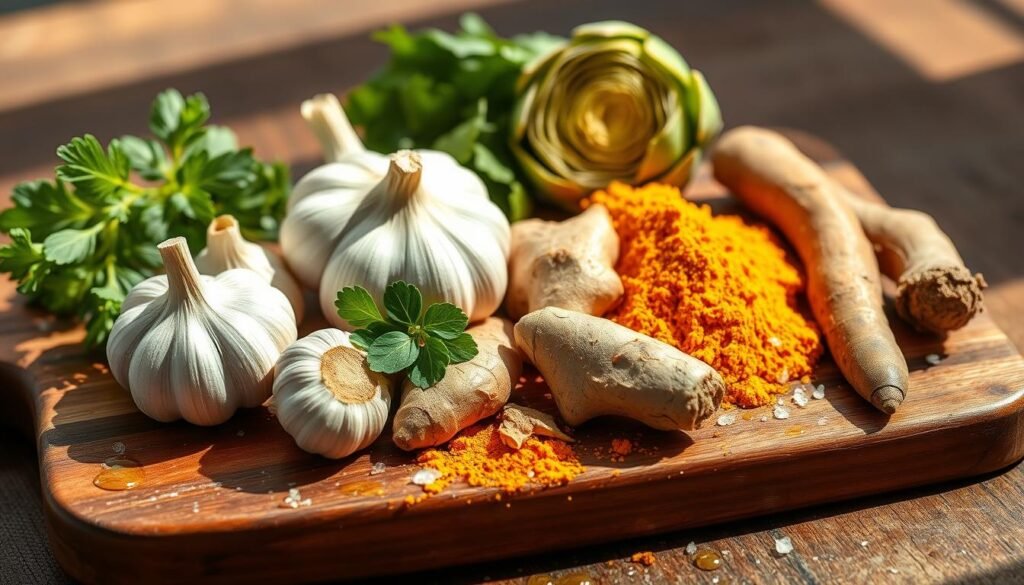About 95 million adults in the United States have high cholesterol. This fact points to a growing issue that can lead to severe heart problems. Many are now looking towards natural herbs to manage their cholesterol. People are discovering the value of cholesterol-lowering herbs. These herbal remedies support heart health without the need for lots of medications.
Herbs such as fenugreek, artichoke leaf extract, and holy basil are now popular. They have shown potential in helping with cholesterol levels. For example, a study in 2020 found that fenugreek could lower cholesterol in diabetics. Another study in 2018 found that artichoke leaf extract could reduce bad LDL cholesterol and triglycerides. These studies help us see how herbal remedies can be part of managing heart health.
There’s a growing interest in the science behind these herbal remedies and lifestyle changes that boost their effects. While these herbal remedies for cholesterol are promising, talking to doctors is key. To learn more about effective natural treatments, visit this resource.
Key Takeaways
- High cholesterol affects nearly 95 million adults in the U.S.
- Natural herbs like fenugreek and artichoke leaf extract can positively impact cholesterol levels.
- A holistic approach, including lifestyle changes, is vital for effective cholesterol management.
- Consultation with healthcare providers is essential when considering herbal remedies.
- Dietary adjustments and physical activity play critical roles in reducing cholesterol.
Understanding Cholesterol and Its Types
Cholesterol is a waxy substance our bodies need to build cells and make hormones. It’s made by the liver and travels in our blood. Knowing about cholesterol and its types helps us make healthier choices.
What is Cholesterol?
Cholesterol is often linked to heart disease, which can be confusing. It’s crucial for our bodies but too much is harmful. Learning about its effects encourages healthier living.
The Role of Lipoproteins
Lipoproteins are made of fats and proteins. They carry cholesterol in the blood. Knowing about them helps us understand cholesterol better.
LDL, or “bad” cholesterol, can block arteries. HDL, or “good” cholesterol, cleans LDL from the blood. It’s important to know the difference.
Differentiating between LDL and HDL Cholesterol
Keeping our hearts healthy means knowing about LDL and HDL cholesterol. Let’s look at how they’re different:
| Type of Cholesterol | Common Name | Function | Health Impact |
|---|---|---|---|
| LDL Cholesterol | Bad Cholesterol | Transports cholesterol to cells | Can lead to artery blockages |
| HDL Cholesterol | Good Cholesterol | Collects cholesterol from cells | Removes LDL from the bloodstream |
Changing our lifestyle is key to managing cholesterol. Being active, eating healthily, and limiting alcohol helps. For more tips on controlling cholesterol, check out natural remedies for cholesterol management.
The Importance of Managing Cholesterol Levels
Millions worldwide are dealing with high cholesterol. It’s tied to major health problems like heart disease, stroke, and more. Managing it well is critical for heart health. Knowing the risks and treatment options leads to positive lifestyle changes.
Health Risks Associated with High Cholesterol
High cholesterol can cause serious issues, including heart problems. It often leads to heart attacks or strokes. Other dangers are:
- Coronary artery disease: It leads to artery blockages, hindering blood flow.
- Peripheral artery disease: This problem affects your limbs’ blood flow.
- High blood pressure: Cholesterol build-ups raise blood pressure, overworking the heart.
- Type 2 diabetes: High cholesterol and insulin issues are linked, bringing extra health risks.
Conventional Treatments for High Cholesterol
Doctors usually recommend medicine and lifestyle changes to tackle high cholesterol. Popular treatments include:
| Treatment Type | Description |
|---|---|
| Statins | They lower LDL by blocking liver-produced cholesterol. |
| Bile Acid Sequestrants | This treatment uses up cholesterol to make more bile. |
| Niacin | It’s a vitamin that lowers bad cholesterol and ups the good. |
| Fibrates | These drugs cut down triglycerides and boost HDL cholesterol. |
Medication works best with lifestyle changes like eating right, exercising, and not smoking. These steps can decrease the effects of high cholesterol and cut down health risks.

Natural Herbs for High Cholesterol
Natural herbs are becoming popular for managing high cholesterol. Studies show these herbs can help control cholesterol. Knowing which herbs are best for high cholesterol can add to your health routine.
Overview of Herbal Remedies
Some herbs, like fenugreek, rosemary, and artichoke, can lower cholesterol. Fenugreek seeds have been shown to cut total cholesterol by up to 33%. Rosemary could help reduce bad cholesterol and raise good cholesterol if used a lot. But, more research is needed to fully understand how safe and effective these herbs are.
How Herbal Remedies Can Help
Using natural herbs might improve your cholesterol levels. For example, swapping saturated fats with olive oil can boost good cholesterol and lower bad cholesterol. Adding herbs to your food not only cuts down on fats but also adds antioxidants. Plus, a Mediterranean diet, which includes various herbs, is heart-healthy.
Still, remember herbs are just part of overall cholesterol management. Staying at a healthy weight, exercising, and eating plenty of plants are key. These lifestyle choices are essential for heart health.

Top Herbal Remedies for Cholesterol Management
Many people manage high cholesterol naturally with herbs. Fenugreek, artichoke extract, and holy basil are top choices. They offer health benefits and research supports their use. These herbs are good for those wanting to lower their cholesterol.
Fenugreek: A Powerful Herbal Ally
Fenugreek is known for its cholesterol-lowering power. Studies show it can reduce cholesterol by 15% to 33%. It also helps control blood sugar, which is great for people with diabetes.
Artichoke Leaf Extract: Benefits and Uses
Artichoke extract is effective against high cholesterol. It can lower LDL cholesterol levels by up to 18.5%, studies say. This extract also boosts bile production and liver health, improving cholesterol management.
Holy Basil: An Ancient Health Booster
Holy basil isn’t just for cooking; it lowers cholesterol too. It’s used in Ayurvedic medicine for heart health. Holy basil reduces heart disease risks with its unique properties. Adding it to daily meals can manage cholesterol levels naturally.

Looking into natural treatments can help manage high cholesterol. They work well with a healthy diet and exercise. Always talk to a healthcare provider before starting any herbal treatments for cholesterol.
Exploring natural solutions offers a variety of herbal options. These include different herbal products known for their cholesterol-lowering effects.
The Role of Other Beneficial Herbs
When we talk about heart health, some herbs really make a difference. Turmeric and ginger are top on the list. They are packed with benefits that help with cholesterol management. This supports a healthy heart lifestyle.
Turmeric: The Golden Spice for Heart Health
Turmeric is famous for its bright yellow color, thanks to curcumin. This key ingredient is being studied for its effects on cholesterol. It seems to lower “bad” cholesterol, also known as LDL. Adding turmeric to your diet, or taking it as a supplement, might boost your heart health.
Ginger: Adding Flavor and Health Benefits
Ginger is not just a spice for your meal or tea; it has impressive health perks. It’s especially good for managing cholesterol. It might lower LDL and raise HDL, which is the “good” cholesterol. Ginger adds a tasty zing to food and is great in tea for a heart-healthy boost.
Using these herbs in your daily meals adds flavor and supports your health. Studies back up their positive effects. For more about herbs and their benefits, check out this guide on fresh herbs.
| Herb | Main Benefits | Suggested Use |
|---|---|---|
| Turmeric | May lower LDL cholesterol | Incorporate in cooking or take as a supplement |
| Ginger | Can reduce LDL cholesterol | Use fresh in meals or brew as a tea |
Incorporating Herbs into Your Diet
Adding herbs to your diet can greatly improve your health, especially with cholesterol. Herbs make meals tastier and add important nutrients for the heart. By using the right cooking methods, we can keep the herbs’ goodness.
Ways to Use Herbs in Cooking
There are many ways to add herbs into your meals. Here are a few ideas:
- Seasoning and Marinades: Use garlic and fennel to season meat, fish, and veggies. They add flavor and help manage cholesterol.
- Herbal Infusions: Ginger and turmeric can make herbal teas. These drinks are refreshing and can lower cholesterol.
- Sauces and Dressings: Hawthorn can enhance homemade sauces or dressings. It tastes good and is good for the heart.
- Fresh Herbs: Use fresh herbs in salads or as garnishes. This way, you get the most health benefits from them.
For convenience, herbal teas are great. They’re an easy way to enjoy herbs’ benefits for the heart.
Herbal Supplements: What to Consider
Herbal supplements can help with cholesterol, especially for those who find it hard to eat enough herbs. It’s important to check the quality of these supplements. When choosing, keep these in mind:
- Source: Pick products from reliable brands that offer clear information and tests.
- Ingredients: Choose extracts with active ingredients that are good for the heart.
- Consultation: Talk to a doctor about your choices, especially if you’re taking medicine or have health issues.
Using herbs in your diet can lead to better health. Everyone’s needs are different, so advice from professionals is key. Making heart-friendly choices in both diet and lifestyle can guide us to better health.
Safety and Precautions When Using Herbal Remedies
Herbal supplements are more popular in the U.S. now than ever before. This makes knowing how to use them safely very important. Even though they are natural, we must be careful with herbal remedies to avoid risks.
Consulting with Healthcare Providers
Before starting any herbal supplement, talking to healthcare providers is key. These natural products aren’t tested as thoroughly as traditional medicines. This means their safety isn’t always clear. Doctors can offer important advice, especially for people taking other medications. Some herbs might not mix well with prescribed drugs.
Understanding Potential Interactions with Medications
Herbal supplements can react with other drugs, causing unwanted side effects. Herbs like Echinacea and Ginkgo biloba are known for strong effects. Problems from these interactions can include feeling sick, dizzy, or getting a rash. In extreme cases, a serious allergic reaction might need urgent care. Knowing these risks helps use herbal remedies safely.
Complementary Lifestyle Changes
Changing your lifestyle can greatly improve your cholesterol levels. By eating better, you can make a big difference in your heart health. Adding healthy foods helps lower bad cholesterol and boost your health. Also, exercising regularly is key for keeping cholesterol in check. It not only helps with cholesterol but also keeps your heart strong.
Dietary Adjustments for Lowering Cholesterol
Choosing the right foods is vital for managing cholesterol. Certain foods can really help bring down bad cholesterol. Here are some to include:
- Soluble Fiber: Found in oats, beans, and fruits, this type of fiber has been shown to reduce LDL cholesterol more effectively than a low-fat diet alone.
- Nuts and Seeds: Almonds, walnuts, and flaxseeds are excellent sources of heart-healthy fats.
- Omega-3 Fatty Acids: Fatty fish, such as salmon and mackerel, can help decrease triglyceride levels.
- Aged Garlic Extract: A study showed that this extract could reduce total cholesterol by 7% and LDL cholesterol by 10%.
- Red Yeast Rice Extract: This natural supplement has demonstrated its ability to lower LDL cholesterol by up to 22% in eight weeks, though caution is necessary regarding its safety.
Exercise and Its Role in Cholesterol Management
Staying active is essential for cholesterol control. Exercise lowers the risk of heart disease greatly:
- Half an hour of exercise five times a week can substantially lower the risk of heart-related issues.
- Active individuals tend to have improved HDL cholesterol levels, countering the effects of LDL cholesterol.
- A study indicated that those incorporating exercise experienced a notable decrease in total cholesterol and LDL levels.
By eating right and staying active, you tackle cholesterol on all fronts. These steps not only lower cholesterol but also boost your health overall. They offer a natural way to stay healthy and lower high cholesterol risks.
Conclusion
Managing high cholesterol is key to keeping a healthy heart. Over 95 million Americans have high cholesterol over 200 mg/dL. They look for natural ways to bring it down. Using herbs like arjuna and Ashwagandha can help. These herbs reduce bad cholesterol and increase good cholesterol.
Adding these herbs to lifestyle changes can make a real difference. Eating more fiber and following a Mediterranean diet are good steps. Regular exercise helps too. This mix can lower cholesterol and promote weight loss, improving heart health.
But it’s important to be careful with herbal remedies. They can interact with other medications. Always talk to healthcare providers before starting. By staying informed and careful, better heart health is within reach.